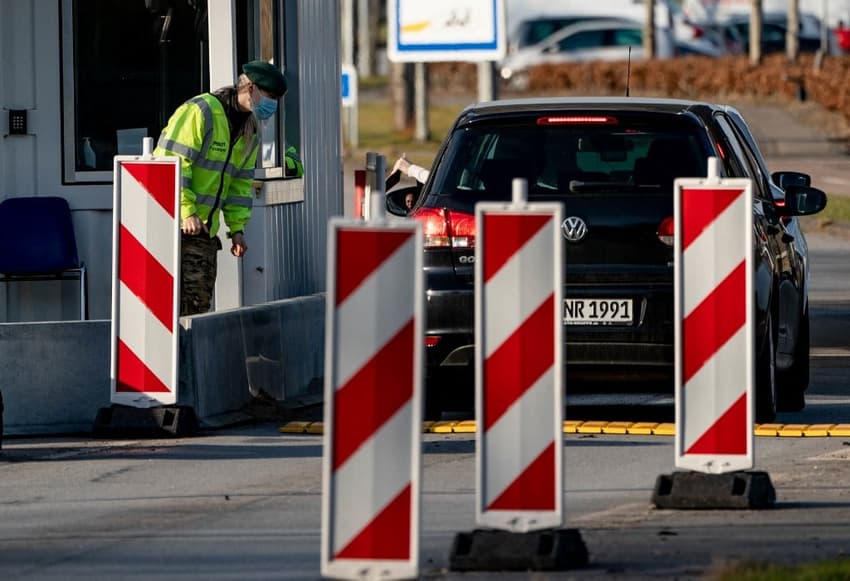Will new Danish border controls make commuting from Germany easier?

Danish authorities say that revised German border controls will reduce congestion and waiting times for commuters crossing between the two countries.
Spot checks on the border with Germany will continue to be carried out by Danish place under revised rules from next month.
But the lower volume of stops will make life a little easier for commuters who make the trip on a regular basis, Denmark's justice minister said on Friday.
One of the border crossings will meanwhile be extended with a larger holding area for vehicles, with the aim of improving flow.
The changes to the German border controls mean that fewer motorists will now be stopped for checks at the border when entering Denmark. Instead, border controls will be made in line with police assessments on where they are most needed.
The new border controls with Germany take effect from May 12th and will be set to expire on November 11th.
READ ALSO: Denmark to stop fewer drivers at German border and scrap checks at Swedish border
“The new form of control will ease life for commuters and we will also construct new asphalt areas and extend the control site at Frøslev [border crossing, ed.],” Justice Minister Peter Hummelgaard said.
Denmark's authorities say the new form of border control will help them to increase focus on cross-border crime and spend more resources combating it. This means that the number of immigration checks on the border will be reduced.
“We are reorganising in such a way that puts more annual police labour hours into fighting crime in the border regions and some police labour hours into immigration control,” he said.
No specifics were given as to the amount of policing that will be reallocated as a result of the new border regime.
Under the rules of the Schengen agreement, countries can place temporary border controls under exceptional circumstances. After a six-month period, the temporary checks must be renewed.
Denmark initially introduced border checks in early 2016 following the refugee crisis of late 2015. It later referred to a more general “security and migration situation” as cause for continually extending the controls.
The EU Commission has previously criticised border controls introduced in several European countries after millions of refugees and migrants crossed EU borders in 2015. Legal experts have meanwhile criticised successive Danish governments over the legal basis of the controls.
Comments
See Also
Spot checks on the border with Germany will continue to be carried out by Danish place under revised rules from next month.
But the lower volume of stops will make life a little easier for commuters who make the trip on a regular basis, Denmark's justice minister said on Friday.
One of the border crossings will meanwhile be extended with a larger holding area for vehicles, with the aim of improving flow.
The changes to the German border controls mean that fewer motorists will now be stopped for checks at the border when entering Denmark. Instead, border controls will be made in line with police assessments on where they are most needed.
The new border controls with Germany take effect from May 12th and will be set to expire on November 11th.
READ ALSO: Denmark to stop fewer drivers at German border and scrap checks at Swedish border
“The new form of control will ease life for commuters and we will also construct new asphalt areas and extend the control site at Frøslev [border crossing, ed.],” Justice Minister Peter Hummelgaard said.
Denmark's authorities say the new form of border control will help them to increase focus on cross-border crime and spend more resources combating it. This means that the number of immigration checks on the border will be reduced.
“We are reorganising in such a way that puts more annual police labour hours into fighting crime in the border regions and some police labour hours into immigration control,” he said.
No specifics were given as to the amount of policing that will be reallocated as a result of the new border regime.
Under the rules of the Schengen agreement, countries can place temporary border controls under exceptional circumstances. After a six-month period, the temporary checks must be renewed.
Denmark initially introduced border checks in early 2016 following the refugee crisis of late 2015. It later referred to a more general “security and migration situation” as cause for continually extending the controls.
The EU Commission has previously criticised border controls introduced in several European countries after millions of refugees and migrants crossed EU borders in 2015. Legal experts have meanwhile criticised successive Danish governments over the legal basis of the controls.
Join the conversation in our comments section below. Share your own views and experience and if you have a question or suggestion for our journalists then email us at [email protected].
Please keep comments civil, constructive and on topic – and make sure to read our terms of use before getting involved.
Please log in here to leave a comment.